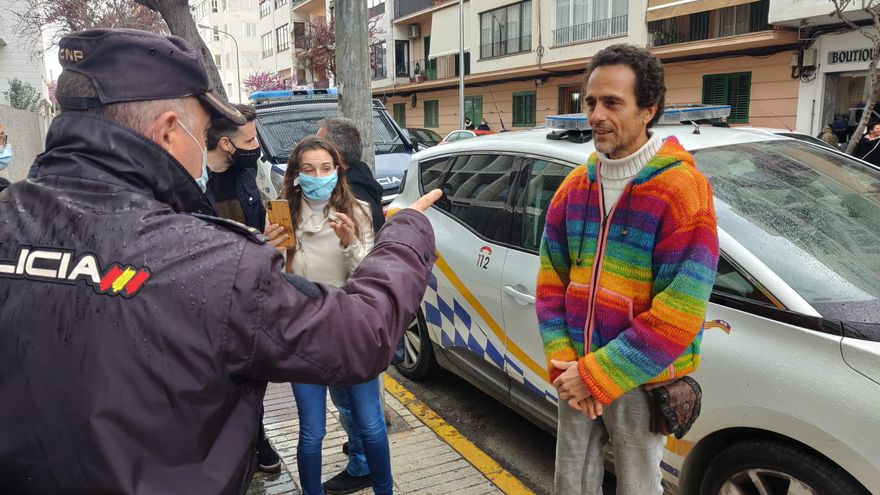“I am not disqualified. That is false”. The doctor Ángel Ruiz-Valdepeñas, who attended the birth of a baby in critical condition in a private home in Santa Eulària last Monday despite being suspended from membership, explains that he has appealed the serious sanction imposed on him last year by the Medical Association of the Balearic Islands, which prevents him from practising for six years.
Ruiz-Valdepeñas believes that no sentence supports the collegiate body’s judgement, and Carles Recasens, vice president of the College of Physicians of the Islands, recalls what is “obvious.” “Of course, he is not disqualified; that is a matter for a judge to decide. However, he is no longer a member. In Spain and the rest of Europe, you cannot practise medicine if you are not registered. Neither at a private nor public clinic, nor in your own private practise. It’s so clear and obvious.” Recasens points out that this is the “key” to the case that the doctor involved “doesn’t want to see.”
Furthermore, the vice-president of the College of Physicians notes that Ruiz-Valdepeñas “is neither an obstetrician, a midwife, nor a paediatrician” to assist with full guarantees in a labour. “There are specialisations, and childbirth is one of them. It is one thing to believe you are qualified to establish a specialisation without having prepared yourself, but it is quite another to be truly qualified” he insists.
The investigation on Ángel Ruiz-Valdepeñas is still ongoing
The Guardia Civil is investigating Ruiz Valdepeñas involvement in the birth. They have already taken statements from multiple witnesses, and the doctor acknowledges that he was forced to identify himself in the residence in front of the agents at the request of a member of the health staff. “They haven’t taken my statement yet, but if they call, I’ll gladly go.”
He requests that he not be labelled a denialist (“it is a term that incites hatred,” he says) for refusing to accept the measures used and approved by scientists to combat covid, and explains that he has not received a salary since his suspension in May 2021. Additionally, he clarifies that he does not advertise for medical assistance. In the instance of this delivery, “I believe it was the family that contacted me through a friendship. I don’t advertise myself; instead, when they call, I go” he reiterates.
The doctor describes the delivery as “a normal pregnancy, a normal delivery,” and the baby “was delivered perfect, with good colour, good reflexes, good crying…. An entirely normal delivery.”
What happened next? “After a few minutes, I’m not sure how many, but after breastfeeding, [the baby] went into cardiorespiratory arrest. This is extremely rare, and it’s the first time I’ve seen it in a newborn without complications. But I am aware that it is something that has recently occurred at Can Misses as well as on a national and international scale; many kids have perished in the last trimester of pregnancy or within hours or days of birth”, he defends himself. Although he does not state so, it is another veiled condemnation of the lethal effects that he claims are induced by covid vaccinations.
Ángel Ruiz-Valdepeñas has no idea what caused the cardiorespiratory arrest
When asked about the likely causes of the cardiorespiratory arrest, Ruiz-Valdepeñas admits, “I don’t know, the hospital will say what happened to a baby who was delivered well, in a controlled pregnancy.”
When asked if the baby’s medical state would have been different if he had been born in a hospital rather than a private house far from prescribed treatment, he responds, “I don’t know.” “The delivery went as expected. This family had made the decision to give birth at home; it was their choice. It’s something else to be in a hospital, then maybe…. But because I was present, I quickly began CPR. Probably sooner than if I had been alone in the room [of the hospital] and had to wait for the midwife, which could take two or five minutes. If I’m not there, even the most medicalized ambulance in the world won’t help.”
The doctor continues: “The medicalized ambulance did a wonderful job with great coordination between doctor, nurse, and technician. And I did my best to assist. But little than a half-hour passed between the time the event occurred, you called 061, and they found the location [the house].” Despite the fact that that time could have been critical for the kid, Ruiz-Valdepeñas argues that “if nothing is done in that half hour, the baby would undoubtedly die, without a doubt.”
He invokes the “chain of survival” to underline the necessity of being present when the child went into cardiorespiratory arrest. “Even if you are at the best hospital in the world with the best neonatal cardiopulmonary resuscitation expert, if nothing is done in the first few minutes, there is nothing to do.”
“Because after such an abrupt cardiorespiratory arrest, after the SAMU arrives after half an hour and it continues… it’s already a miracle.
So, did he succeed in saving the baby’s life? “This baby girl is alive because of a miracle,” he responds. “Because after such an abrupt cardiorespiratory arrest, after the SAMU arrives after half an hour and it continues… it’s already a miracle. Life is a miracle minute by minute, but it is even more remarkable in this situation.”
When challenged about the significance of having a hospital nearby in the event of an emergency, he argues, “I can assure you that if they hadn’t reacted in that half hour, the baby would probably not be in critical condition in Son Espases.”
For the full article, please visit Diario de Ibiza website here.


